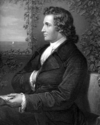Portal:History of science/Article/26

Romanticism, also known as the “Age of Reflexion,” describes the intellectual movement from 1800-1840 that originated in Western Europe as a counter-movement to the Enlightenment of the late 18th century. Romanticism incorporated many fields of study, including art, music, poetry and drama, painting, prose, theology, and philosophy, but Romanticism in science also had a major impact in the 19th century.
European scientists, disillusioned with the mechanical natural philosophy of the Enlightenment as well as the Newtonian model of physics, supported the belief that observing nature meant understanding the self and that the answers that nature could give us should not be obtained by force. They warned that Enlightenment encouraged the abuse of the sciences and sought to advance a new way of increasing scientific knowledge, one they felt would be even more beneficial to not only mankind but to nature as well.
Romanticism set forth different themes: it was anti-reductionist (the whole was more valuable than the parts alone), championed epistemological optimism (man was connected to nature), and encouraged creativity, experience, and genius.
The decline of Romanticism occurred because a new movement, Positivism, began to take hold of the ideals of the intellectuals around 1840 that lasted until about 1880. Like the intellectuals who were disenchanted with the Enlightenment and preferred a new approach to science, people lost interest in Romanticism and wanted to study science using a stricter process.
